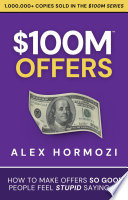
From "$100M Offers: How to Make Offers So Good People Feel Stupid Saying No"
The Value Equation and Maximizing Perceived Value
Key Economic Insight
The ultimate business goal is to charge the highest possible prices by creating a vast discrepancy between the cost of delivering a product or service and its perceived value to the customer. This requires abandoning traditional notions of 'fair' pricing, as exemplified by successful companies charging significant sums for offerings with minimal production costs, such as phone companies adding users for pennies or pharmaceutical firms selling drugs for hundreds of dollars a month despite low manufacturing expenses. To achieve unreasonable success, one should aim to charge up to a hundred times the fulfillment cost, ensuring the offer remains an undeniable 'steal' for the prospect due to the immense value provided. This strategy unlocks unlimited pricing power, enabling business scaling and substantial impact, as demonstrated by a photography business that increased its average ticket from $300 to $1,500, resulting in a 38x profit increase from $1,000/wk to $38,000/wk, which also facilitated nearly $500,000 in charitable donations.
Value is determined by four key drivers: increasing the 'Dream Outcome' and 'Perceived Likelihood of Achievement,' and decreasing the 'Perceived Time Delay Between Start and Achievement' and 'Perceived Effort & Sacrifice.' These correspond directly to customer questions like 'What will I make?', 'How will I know it's going to happen?', 'How long will it take?', and 'What is expected of me?'. While easily making grand promises for 'Dream Outcome' and 'Perceived Likelihood' is common, true competitive advantage is found in relentlessly minimizing 'Time Delay' and 'Effort & Sacrifice.' Leading companies like Apple, Amazon, and Netflix exemplify this by making their offerings immediate, seamless, and effortless. Theoretically, if both 'Time Delay' and 'Effort & Sacrifice' could be reduced to zero, the product would possess infinite value. Crucially, 'Perception is Reality'; value is only realized when the prospect *perceives* these increases and decreases, as shown in the London tunnel system, where a multi-million dollar dotted map showing train times improved rider satisfaction more than multi-billion dollar train speed increases, by altering the *perception* of waiting time.
Solving problems often benefits more from psychological solutions than from logical ones, as logical approaches are frequently exhausted. For instance, enhancing satisfaction with train travel might involve reducing the *pain of waiting* with a map, rather than just making trains faster. Similarly, distracting elevator users with mirrors makes waiting seem shorter. The 'Dream Outcome' channels deep, inherent desires such as 'to be perceived as beautiful,' 'to be respected,' or 'to increase their status,' with status being a particularly potent motivator. People pay for 'Perceived Likelihood of Achievement,' valuing certainty; for example, a plastic surgeon's 10,000th patient is worth far more than their first. 'Time Delay' highlights that 'Fast Beats Free,' meaning people will readily pay for speed, as seen with services like FedEx over USPS or Uber over walking. Lastly, 'Effort & Sacrifice' encompasses all ancillary costs, both tangible and intangible. The stark difference in perceived value between fitness and liposuction for similar outcomes illustrates this, explaining why 'done for you services' are more expensive due to reduced effort and higher perceived likelihood of achievement. The supplement industry ($123B) significantly outsizes the health club industry ($62B) because supplements offer lower perceived effort and sacrifice for similar health goals.
📚 Continue Your Economic Learning Journey
Access the complete $100M Offers: How to Make Offers So Good People Feel Stupid Saying No summary with audio narration, key takeaways, and actionable insights from Alex Hormozi.